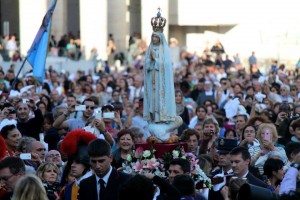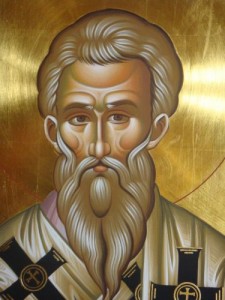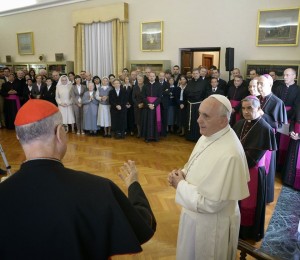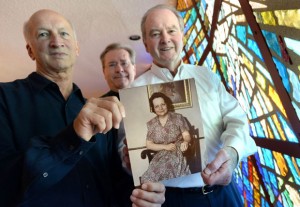 We are at the anniversary of the final apparition of Our Lady of Fatima in 1917. We know of the Pope’s profound love of the Blessed Virgin Mary (a common trait of the last Popes).
We are at the anniversary of the final apparition of Our Lady of Fatima in 1917. We know of the Pope’s profound love of the Blessed Virgin Mary (a common trait of the last Popes).
Here is a booklet on Our Lady of Fatima.
Yesterday and today in Rome the Church and the world were consecrated to the maternal protection of the great Mother of God, Our Lady of Fatima.
The homily for today’s Mass the Pope hits on some well known themes: gratitude, remembrance, God surprises, our reliance on God, openness to the Divine initiative and trust. Put together we have a vision of what our life ought to be like: a Yes to the Lord in ALL things. Mercy is available. Do we ask for mercy?
In the Psalm we said: “Sing to the Lord a new song, for he has done marvellous things” (Ps 98:1). Today we consider one of the marvellous things which the Lord has done: Mary! A lowly and weak creature like ourselves, she was chosen to be the Mother of God, the Mother of her Creator.
Considering Mary in the light of the readings we have just heard, I would like to reflect with you on three things: first, God surprises us, second, God asks us to be faithful, and third, God is our strength.
First: God surprises us. The story of Naaman, the commander of the army of the king of Aram, is remarkable. In order to be healed of leprosy, he turns to the prophet of God, Elisha, who does not perform magic or demand anything unusual of him, but asks him simply to trust in God and to wash in the waters of the river. Not, however, in one of the great rivers of Damascus, but in the little stream of the Jordan. Naaman is left surprised, even taken aback. What kind of God is this who asks for something so simple? He wants to turn back, but then he goes ahead, he immerses himself in the Jordan and is immediately healed (cf. 2 Kg 5:1-4). There it is: God surprises us. It is precisely in poverty, in weakness and in humility that he reveals himself and grants us his love, which saves us, heals us and gives us strength. He asks us only to obey his word and to trust in him.
This was the experience of the Virgin Mary. At the message of the angel, she does not hide her surprise. It is the astonishment of realizing that God, to become man, had chosen her, a simple maid of Nazareth. Not someone who lived in a palace amid power and riches, or one who had done extraordinary things, but simply someone who was open to God and put her trust in him, even without understanding everything: “Here I am, the servant of the Lord; let it be with me according to your word” (Lk 1:38). That was her answer. God constantly surprises us, he bursts our categories, he wreaks havoc with our plans. And he tells us: trust me, do not be afraid, let yourself be surprised, leave yourself behind and follow me!
Today let us all ask ourselves whether we are afraid of what God might ask, or of what he does ask. Do I let myself be surprised by God, as Mary was, or do I remain caught up in my own safety zone: in forms of material, intellectual or ideological security, taking refuge in my own projects and plans? Do I truly let God into my life? How do I answer him?
In the passage from Saint Paul which we have heard, the Apostle tells his disciple Timothy: remember Jesus Christ. If we persevere with him, we will also reign with him (cf. 2 Tim 2:8-13). This is the second thing: to remember Christ always – to be mindful of Jesus Christ – and thus to persevere in faith. God surprises us with his love, but he demands that we be faithful in following him. We can be unfaithful, but he cannot: he is “the faithful one” and he demands of us that same fidelity. Think of all the times when we were excited about something or other, some initiative, some task, but afterwards, at the first sign of difficulty, we threw in the towel. Sadly, this also happens in the case of fundamental decisions, such as marriage. It is the difficulty of remaining steadfast, faithful to decisions we have made and to commitments we have made. Often it is easy enough to say “yes”, but then we fail to repeat this “yes” each and every day. We fail to be faithful.
Mary said her “yes” to God: a “yes” which threw her simple life in Nazareth into turmoil, and not only once. Any number of times she had to utter a heartfelt “yes” at moments of joy and sorrow, culminating in the “yes” she spoke at the foot of the Cross. Here today there are many mothers present; think of the full extent of Mary’s faithfulness to God: seeing her only Son hanging on the Cross. The faithful woman, still standing, utterly heartbroken, yet faithful and strong.
And I ask myself: am I a Christian by fits and starts, or am I a Christian full-time? Our culture of the ephemeral, the relative, also takes its toll on the way we live our faith. God asks us to be faithful to him, daily, in our everyday life. He goes on to say that, even if we are sometimes unfaithful to him, he remains faithful. In his mercy, he never tires of stretching out his hand to lift us up, to encourage us to continue our journey, to come back and tell him of our weakness, so that he can grant us his strength. This is the real journey: to walk with the Lord always, even at moments of weakness, even in our sins. Never to prefer a makeshift path of our own. That kills us. Faith is ultimate fidelity, like that of Mary.
The last thing: God is our strength. I think of the ten lepers in the Gospel who were healed by Jesus. They approach him and, keeping their distance, they call out: “Jesus, Master, have mercy on us!” (Lk 17:13). They are sick, they need love and strength, and they are looking for someone to heal them. Jesus responds by freeing them from their disease. Strikingly, however, only one of them comes back, praising God and thanking him in a loud voice. Jesus notes this: ten asked to be healed and only one returned to praise God in a loud voice and to acknowledge that he is our strength. Knowing how to give thanks, to give praise for everything that the Lord has done for us.
Take Mary. After the Annunciation, her first act is one of charity towards her elderly kinswoman Elizabeth. Her first words are: “My soul magnifies the Lord”, in other words, a song of praise and thanksgiving to God not only for what he did for her, but for what he had done throughout the history of salvation. Everything is his gift. If we can realise that everything is God’s gift, how happy will our hearts be! Everything is his gift. He is our strength! Saying “thank you” is such an easy thing, and yet so hard! How often do we say “thank you” to one another in our families? These are essential words for our life in common. “Excuse me”, “sorry”, “thank you”. If families can say these three things, they will be fine. “Excuse me”, “sorry”, “thank you”. How often do we say “thank you” in our families? How often do we say “thank you” to those who help us, those close to us, those at our side throughout life? All too often we take everything for granted! This happens with God too. It is easy to approach the Lord to ask for something, but to go and thank him: “Well, I don’t need to”.
As we continue our celebration of the Eucharist, let us invoke Mary’s intercession. May she help us to be open to God’s surprises, to be faithful to him each and every day, and to praise and thank him, for he is our strength. Amen.









